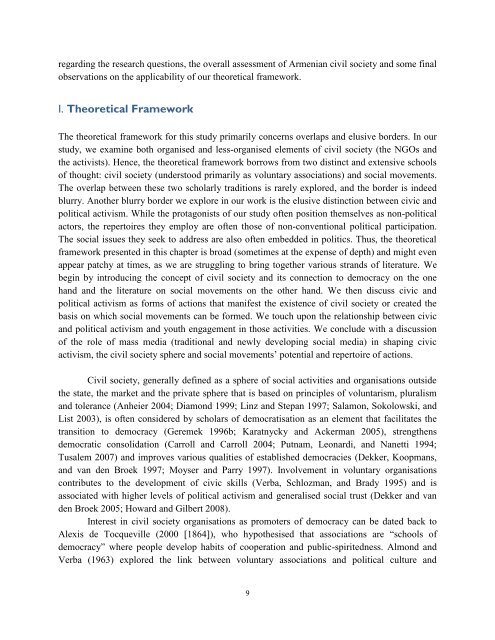Civic Activism as a Novel Component of Armenian Civil Society
English-3
English-3
You also want an ePaper? Increase the reach of your titles
YUMPU automatically turns print PDFs into web optimized ePapers that Google loves.
egarding the research questions, the overall <strong>as</strong>sessment <strong>of</strong> <strong>Armenian</strong> civil society and some final<br />
observations on the applicability <strong>of</strong> our theoretical framework.<br />
I. Theoretical Framework<br />
The theoretical framework for this study primarily concerns overlaps and elusive borders. In our<br />
study, we examine both organised and less-organised elements <strong>of</strong> civil society (the NGOs and<br />
the activists). Hence, the theoretical framework borrows from two distinct and extensive schools<br />
<strong>of</strong> thought: civil society (understood primarily <strong>as</strong> voluntary <strong>as</strong>sociations) and social movements.<br />
The overlap between these two scholarly traditions is rarely explored, and the border is indeed<br />
blurry. Another blurry border we explore in our work is the elusive distinction between civic and<br />
political activism. While the protagonists <strong>of</strong> our study <strong>of</strong>ten position themselves <strong>as</strong> non-political<br />
actors, the repertoires they employ are <strong>of</strong>ten those <strong>of</strong> non-conventional political participation.<br />
The social issues they seek to address are also <strong>of</strong>ten embedded in politics. Thus, the theoretical<br />
framework presented in this chapter is broad (sometimes at the expense <strong>of</strong> depth) and might even<br />
appear patchy at times, <strong>as</strong> we are struggling to bring together various strands <strong>of</strong> literature. We<br />
begin by introducing the concept <strong>of</strong> civil society and its connection to democracy on the one<br />
hand and the literature on social movements on the other hand. We then discuss civic and<br />
political activism <strong>as</strong> forms <strong>of</strong> actions that manifest the existence <strong>of</strong> civil society or created the<br />
b<strong>as</strong>is on which social movements can be formed. We touch upon the relationship between civic<br />
and political activism and youth engagement in those activities. We conclude with a discussion<br />
<strong>of</strong> the role <strong>of</strong> m<strong>as</strong>s media (traditional and newly developing social media) in shaping civic<br />
activism, the civil society sphere and social movements’ potential and repertoire <strong>of</strong> actions.<br />
<strong>Civil</strong> society, generally defined <strong>as</strong> a sphere <strong>of</strong> social activities and organisations outside<br />
the state, the market and the private sphere that is b<strong>as</strong>ed on principles <strong>of</strong> voluntarism, pluralism<br />
and tolerance (Anheier 2004; Diamond 1999; Linz and Stepan 1997; Salamon, Sokolowski, and<br />
List 2003), is <strong>of</strong>ten considered by scholars <strong>of</strong> democratisation <strong>as</strong> an element that facilitates the<br />
transition to democracy (Geremek 1996b; Karatnycky and Ackerman 2005), strengthens<br />
democratic consolidation (Carroll and Carroll 2004; Putnam, Leonardi, and Nanetti 1994;<br />
Tusalem 2007) and improves various qualities <strong>of</strong> established democracies (Dekker, Koopmans,<br />
and van den Broek 1997; Moyser and Parry 1997). Involvement in voluntary organisations<br />
contributes to the development <strong>of</strong> civic skills (Verba, Schlozman, and Brady 1995) and is<br />
<strong>as</strong>sociated with higher levels <strong>of</strong> political activism and generalised social trust (Dekker and van<br />
den Broek 2005; Howard and Gilbert 2008).<br />
Interest in civil society organisations <strong>as</strong> promoters <strong>of</strong> democracy can be dated back to<br />
Alexis de Tocqueville (2000 [1864]), who hypothesised that <strong>as</strong>sociations are “schools <strong>of</strong><br />
democracy” where people develop habits <strong>of</strong> cooperation and public-spiritedness. Almond and<br />
Verba (1963) explored the link between voluntary <strong>as</strong>sociations and political culture and<br />
9



